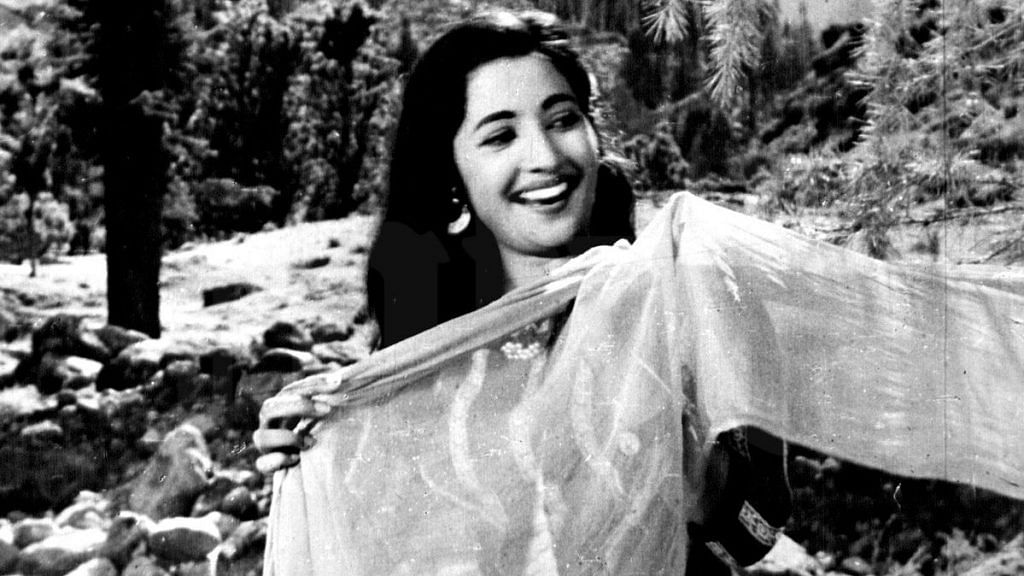On her fifth death anniversary, ThePrint takes a look at the career of Suchitra Sen who symbolised the modern woman for Bengali cinema.
In life, as in death, Suchitra Sen was an enigma. The ‘mahanayika’ of Bengali cinema lived in rumours and suggestions — was she in love with actor Uttam Kumar, was she India’s Greta Garbo, did the crown of being a superstar sit easy on her head, or did she become a recluse voluntarily?
But on screen, what the audience saw in her 60-odd films was an honest act. For the couple of hours on screen, no one could question Suchitra Sen or the conviction with which she played her roles — whether it was Paro in Bimal Roy’s Devdas (1955), Radha in Asit Sen’s Deep Jwele Jai (1959) or Aarti Devi in Gulzar’s Aandhi (1975).
Sen, whose fifth death anniversary is today, was at the peak of her career through 1950s to 1970s and acted in both Bengali and Hindi films.
Also read: With 2019 elections approaching, Gulzar’s Aandhi is the film to watch again
A new woman
Known as Mrs Sen to her industry counterparts and Roma in her close circle, Sen brought something unique to the Bengali film industry.
She symbolised the new bhadramahila of the 1950s — a woman who was modern and had principles, a woman who had a career but could put it on the backburner, a woman who could speak English and belong in the city. But more importantly, she was a stylish and suave woman the middle-class Bengali could openly desire.
“In her embodiment of an unparalleled agency, she was distinct from the suffering women of Sarat Chandra, as well as the overtly sexualised, erotic object of the contemporary Bollywood film,” wrote Sharmistha Gooptu in her book Bengali Cinema: An Other Nation.
It was in her pairing with Uttam Kumar on screen that Bengali cinema got its iconic duo. Of her over 60 films, Sen acted in 30 with Kumar. He was the virtuous, good-looking, wayfarer-wearing modern man, while she was the strong, beautiful and reasoned woman.
They were an instant hit — producers would endorse them, directors would scramble to sign them, and great scripts would be written for them. Although some may argue that this led to little scope for experimentation, the Uttam-Suchitra pairing worked across genres. Sharey Chuattor (1953), Agni Pariksha (1954), Harano Sur (1957), Pathey Holo Deri (1957) and Saptapadi (1961) stand testimony to their acting prowess and charm.
Sen would sometimes be paid more than the men acting with her and was never a secondary prop on screen. Most of her films came with the guarantee of commercial success — she had become not only a mahanayika, but a brand to reckon with.
Her foray into Bollywood gave the Hindi film audiences some memorable films like Gulzar’s Aandhi and Bimal Roy’s Devdas.
But success didn’t come easily to Mrs Sen.
Also read: Prithviraj Kapoor: The monarch of Hindi cinema and titan of stirring theatre
The Calcutta woman
Long before romancing the silver screen, Suchitra Sen was Roma Dasgupta born in 1931 in Pabna, now in Bangladesh. She was the fifth among three brothers and five sisters. She got married early to Dibanath Sen, a rich man from a joint family, who recognised her artistic potential and wanted her to join the film fraternity — something he would actively help her do. Unlike most other actresses at the time, she made her debut in cinema after being married and becoming a mother.
She did have to struggle, though. She had to let go of the Bangladeshi twang in her dialect to adapt to the Calcutta (now Kolkata) way of speaking; she had to adopt the mannerisms of the elite city woman and get used to a world that was alien to her. But she made all of this look effortless.
The marriage between Dibanath and Suchitra became strained later on. Dibanath died in an accident in the US in 1969. She continued working but insisted his body be flown down to Kolkata for their daughter Moon Moon Sen.
In the 1970s, her film Pronoy Pasha (1978) flopped. Sen disappeared from the public gaze, and did not emerge even to receive a Dadasaheb Phalke award, refusing India’s biggest film award.
On 17 January 2014, Suchitra Sen died after a massive heart attack. But flip through TV channels on any weekend afternoon and you might well chance upon a black and white film of hers.
